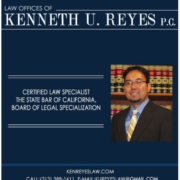ALL property, real or personal, wherever situated, acquired by a married person during the marriage while domiciled in California is community property. Family Code 760.
However, there are situations in which the marriage may be held to be null and void. These situations include, but are not limited to entering into a bigamous marriage, fraud and misrepresentation in entering into a marriage, etc. The legal consequences of having your marriage annulled by your spouse are that it results in you not having any community property interest on property acquired by your spouse during the marriage. A nullity may also cut off your claim for spousal support.
What options do you have if your spouse files a nullity against you? You may still have a claim to community property and support as a putative spouse. A party to a void or voidable marriage has “putative spouse” status only if he or she believed in good faith the marriage was valid. Family.Code. § 225; Marriage of Guo & Sun (2010) 186 CA4th 1491, 1493, 112 CR3d 906, 908; Marriage of Vryonis (1988) 202 CA3d 712, 721, 248 CR 807, 813. A party who has the requisite objectively reasonable “good faith” belief may be a putative spouse where any legal infirmity in formation of the marriage renders the marriage invalid. Domestic Partnership of Ellis & Arriaga (2008) 162 CA4th 1000, 1005, 76 CR3d 401, 404; Estate of DePasse (2002) 97 CA4th 92, 107, 118 CR2d 143, 155; see Marriage of Vryonis, supra, 202 CA3d at 718–719, 248 CR at 811–812.
A party’s “good faith” belief in the validity of the marriage is not tested by whether he or she believed a “marriage” lawfully occurred under some private, secular or spiritual set of standards. A putative spouse must have had a good faith belief in the existence of a lawful California marriage. Estate of DePasse (2002) 97 CA4th 92, 107–108, 118 CR2d 143, 156; Welch v. State of Calif. (2000) 83 CA4th 1374, 1378–1379, 100 CR2d 430, 432–433; Marriage of Vryonis (1988) 202 CA3d 712, 723, 248 CR 807, 814–815.
“Good faith” belief is tested by an objective standard based on facts that would cause a reasonable person under the circumstances to harbor a good faith belief in the existence of a valid California marriage. Domestic Partnership of Ellis & Arriaga, supra, 162 CA4th at 1005, 76 CR3d at 404; Marriage of Guo & Sun (2010) 186 CA4th 1491, 1497, 112 CR3d 906, 911; Marriage of Ramirez & Llamas (2008) 165 CA4th 751, 756, 81 CR3d 180, 183. Whether a party had an objectively reasonable “good faith” belief is a question of fact to be determined in light of all the circumstances.
Successfully proving putative spouse status or putative marriage status in court gives rise to certain property, support and attorney fees/costs rights, as well as certain other rights that ordinarily attach only between lawfully married persons. Property that would have been community or quasi-community property had the marriage been valid is deemed “quasi-marital property” and, in a proceeding to terminate the invalid marriage, “shall” be divided between the parties as if it were community. Family.Code. § 2251(a)(2); Marriage of Tejeda (2009) 179 CA4th 973, 983, 102 CR3d 361, 368; Quasi-marital property divided pursuant to § 2251 is also liable for the parties’ debts to the same extent as if it had been community or quasi-community property. Family.Code. § 2252.
In addition, “temporary” and “permanent” spousal support may also be awarded in a nullity proceeding in favor of a putative spouse “in the same manner as if the marriage had not been void or voidable” Family Code Section 2254. The court may also award attorney’s fees pursuant to family code section 2030 in favor of a party found to be “innocent of fraud or wrongdoing in inducing or entering into the marriage, and free from knowledge of the then existence of any prior marriage or other impediment to the contracting of the marriage for which a judgment of nullity is sought.” Family Code Section 2255.
* * *
Please note that this article is not legal advice and is not intended as legal advice. The article is intended to provide only general, non-specific legal information. This article is not intended to cover all the issues related to the topic discussed. The specific facts that apply to your matter may make the outcome different than would be anticipated by you. This article does create any attorney-client relationship between you and the Law Offices of Kenneth U. Reyes, APLC. This article is not a solicitation.
* * *
Attorney Kenneth Ursua Reyes is a Certified Family Law Specialist. He was President of the Philippine American Bar Association. He is a member of both the Family law section and Immigration law section of the Los Angeles County Bar Association. He is a graduate of Southwestern University Law School in Los Angeles and California State University, San Bernardino School of Business Administration. He has extensive CPA experience prior to law practice. LAW OFFICES OF KENNETH REYES, APLC. is located at 3699 Wilshire Blvd., Suite 747, Los Angeles, CA, 90010. Tel. (213) 388-1611 or e-mail kenneth@kenreyeslaw.com or visit our website at Kenreyeslaw.com.
(Advertising Supplement)







